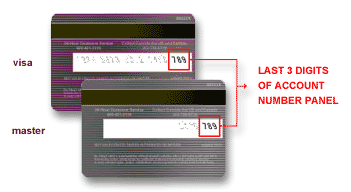Credit Card Explanation of Information Needed for Payment of the Online Code Course Continuing Education Test
Where can I find the this Security Code? 
Visa/Mastercard and Discover Users
Flip your card over and look at the signature box. You should see either the entire 16-digit credit card number or just the last four digits followed by a special 3-digit code. This 3-digit code is your Card Security Code.
What is the Security Code?
It is an important new Internet security feature that now appears on the back of most Visa/MasterCard and Discover cards, and on the front of American Express cards. This new code is a three or four-digit number which provides a cryptographic check of the information embossed on the card.
The security code helps validate that the customer placing the online order actually has the credit card in his/her possession, and that the credit/debit card account is legitimate.
How does my Security Code protect me?
The security code is only printed on the card and it is not contained in the magnetic stripe information nor does it appear on sales receipts or billing statements – you must have the card in your possession in order to use this code.
Card Security Codes are not raised, so they are not scanned into standard credit card readers.
In theory, these numbers are only visible to you. When you give your Card Security Code to a merchant, you assist the merchant in verifying that the order is being placed by you, the card holder.
Do I have to enter this Security Code?
If this code is printed on your card, YES, you must enter the code. Visa, MasterCard, Discover and American Express now require Internet stores to obtain the security code for all cards that have a code printed on them. In order for this transaction to be accepted and processed, you must enter this code if it’s printed on your card. This is done for your protection.
What if I can not read my number?
If you cannot read the number on your card, enter the letter “I” as in “illegible” in the CVV field. This will let your bank know that the number is there, but cannot be read. Putting in an “X” instead of an “I” may cause your bank to deny the sale.
